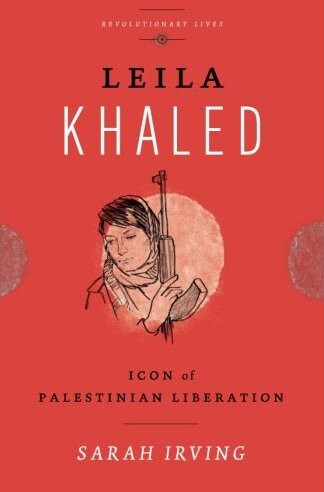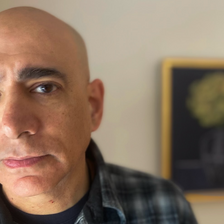The Electronic Intifada 23 May 2012

Although long-past its revolutionary heyday, the Popular Front for the Liberation of Palestine is still the biggest leftist force in Palestinian political life. The PFLP’s most recognizable icon is perhaps still the 1969 photo of their commando Leila Khaled, wrapped in a checkered scarf — or kuffiyeh — and clutching an AK-47 rifle.
Known primarily for the two aircraft hijacking operations she was involved with in 1969 and 1970, Khaled has since then become a major PFLP activist and leader in her own right. It may come as a surprise, then, that before the publication of Leila Khaled: Icon of Palestinian Liberation, there was no biography of her (apart from an autobiography in the 1970s). The Electronic Intifada contributor Sarah Irving has set out to right this wrong, and achieves it ably with this exciting little book, newly published by Pluto Press as part of its “Revolutionary Lives” series.
A major strength of the book is that its based mostly on primary source material: interviews with Khaled herself at her home in Amman, Jordan. Irving also dove into the archives, reading seemingly everything there was to be found in English on Khaled.
Leila Khaled was only a small child when her family fled Haifa before the Zionist ethnic cleansing operations could reach them. Her father briefly joined the Palestinian resistance before the family ended up refugees in Lebanon, like thousands of other Palestinians (14). There she and others in her family joined the Arab National Movement founded by George Habash, from which the PFLP emerged in 1967.
Eventually, she persuaded the Marxist-Leninist group to train her as a guerrilla fighter in Jordan. Irving describes Khaled’s time camping in the hinterlands north of Amman, learning how to use grenades and to shoot: “I was so happy that for the first three days and night I could not sleep,” Khaled said (29).
Thoughtful
In 1969 she and fellow fighter Salim Issawi hijacked TWA flight 840, forcing it to fly to Damascus. The passengers were freed, apart from two Israeli males who were eventually exchanged for Syrian and Palestinians prisoners being held by Israel. Khaled and her comrade spent a short time in jail, but were soon released by the Syrians who had treated them “like naughty but indulged children” (37).
The chapter on this incident is a very thoughtfully written meditation on how the nature of hijackings has fundamentally changed since 2001. Irving has been sensitive to the plight of civilian passengers caught up in the incident, without resorting to hypocritical denunciations of “terrorism.”
The larger-scale, multi-airline 1970 operation which precipitated “Black September” (the brutal crackdown on Palestinian resistance fighters in Jordan) is also very well recounted, with some interesting historical detail. The hijacking was ultimately a partial success, with several Palestinian prisoners being released from European prisons. But Khaled herself had chosen the most difficult target: a plane from Israeli airline El Al. She was captured, and her comrade Patrick Arguello (a Nicaraguan from the Sandinista movement) was killed by an Israeli guard (50). Khaled ended up in British custody after the pilot made an emergency stop in the UK.
The book as a whole is a really enjoyable read. It even has some funny moments, such as when her own mother did not at first believe that Leila had been behind the 1969 hijacking because press reported had emphasized her physical beauty: “I know my daughter … she’s not like they are saying, all this beauty” (39). Later on, she tries to dissuade the man who became Leila’s second (and current) husband not to marry her daughter: “Why do you want to marry her? She is always busy. If my son wanted to marry a woman like this I wouldn’t accept it” (80).
Primary oppressor
There is good chapter on the issue of women’s rights in the Palestinian revolutionary context. Khaled argues to Irving that the Israeli occupation must be dealt with as the primary oppressor: “Now which is more dangerous? The one who puts you in prison or your father who will not allow you to choose your partner?”
On the other hand, Khaled is not arguing that the struggle for gender equality be deferred to focus on socialism alone: “We believe that the [socialist] struggle can achieve some rights for us [women] … but it doesn’t always go in parallel” (102). Irving weights up different opinions and quotes dissenting views. This book is surprisingly comprehensive considering its length.
I do have some criticisms. For example, it is claimed that Ahmad Jibril’s PFLP-General Command splintered from the PFLP in 1970 (27). In fact it was in 1968 (according to the Palestine Liberation Organization leader Shafiq al-Hout’s memoirs).
More importantly, in her otherwise good discussion of the motivations for the hijackings, Irving neglects to mention two key points.
Firstly, while it is true that Palestinians were being ignored in the international media (34), she should also have mentioned Israeli Prime Minister Golda Meir’s infamous 1969 assertion that “There were no such thing as Palestinians.” The hijackings forced Palestinians onto the news agenda.
Second, although Irving writes that a Peruvian group had carried out an airline hijacking “as far back as 1931” (30) and that Palestinians therefore did not invent the tactic, she should have mentioned that it was Israel which introduced hijacking to the Middle East. In December 1954, an Israeli military aircraft forced down a Syrian civilian plane to obtain hostages to exchange for Israeli soldiers. As quoted by Noam Chomsky, Israeli Prime Minister Moshe Sharett wrote in his diary that “our action was without precedent in the history of international practice” (Fateful Triangle, page 77). It seems that Sharett hadn’t heard about the Peruvians.
But overall, this little book punches above its weight. The reader gains a greater understanding not only of the revolutionary icon Leila Khaled, but also the wider Palestinian left.
Asa Winstanley is a journalist from London who has lived in and reported from occupied Palestine. His website is www.winstanleys.org.





